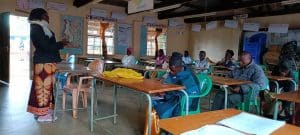July 1 is the International Day of Co-operatives, an annual celebration of the co-operative movement.
This year’s theme is “Co-operatives for sustainable development,” which showcases how the values and principles along with the co-operative way of working together are accomplishing the United Nations’ (UN) Sustainable Development Goals (SDGs).
The goals of the 17 SDGs are to end poverty, protect the planet and improve the lives of everyone, everywhere. UN member states adopted these goals in 2015 and developed a 15-year plan to achieve them.
This year is the 101st International Co-operative Day and the 29th International Day of Co-operatives that is recognized by the UN.
 Since 1947, the Co-operative Development Foundation of Canada (CDF Canada) has helped organize and build co-operatives in developing countries by creating resilient, strong, and democratic organizations that help their members and communities thrive.
Since 1947, the Co-operative Development Foundation of Canada (CDF Canada) has helped organize and build co-operatives in developing countries by creating resilient, strong, and democratic organizations that help their members and communities thrive.
CDF Canada is committed to fulfilling one or more of the SDGs for each project. Each project carries out a gender assessment with local stakeholders to identify the needs of women and marginalized groups. The assessment process builds a gender equality strategy aimed at overcoming barriers to gender equality and inclusion in the project context.
As part of CDF Canada’s current projects, the VOICE for Women and Girls program advances gender equality and economic empowerment to 50,000 women and men co-operative members from marginalized groups in Ethiopia, Kenya, Malawi, Ghana, and Senegal.
What’s more, the Supporting Economic Prosperity for Women and Internally Displaced Persons in Ukraine (SEW Ukraine) project aims to foster economic prosperity to 2,200 vulnerable women. The project supports them through vocational training, workplace integration training and providing ancillary services . The project also assists women with higher skills to establish, micro, small and medium-sized enterprises as well as forming garment co-ops across the country.
At the same time, CDF Canada’s projects tackle food insecurity, climate change and sustainability with the 4R Nutrient Stewardship Project. It aims to improve the socio-economic well-being and resilience of 80,000 smallholder farmers in Ethiopia, Ghana, and Senegal through enhanced agricultural productivity and sustainability.
All three projects have contributed to forming co-operatives that create a sustainable future by advocating for gender equality and the socio-economic well-being for women and men.
As part of CDF Canada’s mandate, the organization focuses on strengthening co-operatives while increasing pluralism, democracy, and human rights within them. Canadian Volunteers also work with co-operatives to share knowledge and capacities, such as good governance.